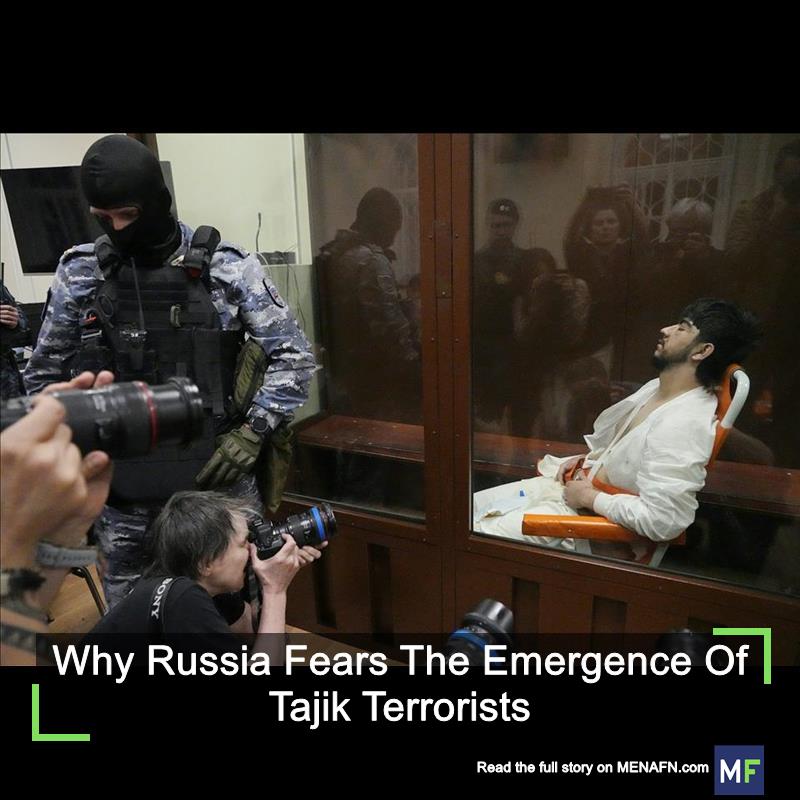
Why Russia Fears The Emergence Of Tajik Terrorists
Does their nationality have anything to do with their alleged terrorism? Many Russians probably think so.
Russian President Vladimir Putin, right, and Tajikistan President Emomali Rahmon pose for a photo prior to their talks in Russia in February 2024. (Kristina Kormilitsyna, Sputnik, Kremlin Pool Photo via AP)
Tajikistan, a landlocked country of 10 million sandwiched between Uzbekistan, Afghanistan and China, is the most impoverished of the former Soviet republics. Known for its corruption and political repression, it has chafed under the iron-fisted rule of President Emomali Rahmon since 1994.
There are estimated to be well over three million Tajiks living in Russia, about one-third of the total Tajik population. Most of them hold the precarious status of“guest workers ,” holding low-paying jobs in construction, produce markets or even cleaning public toilets.
In this April 2015 photo, a Tajik migrant municipal worker carries Russian national and Moscow city flags to decorate a department store near Red Square in Moscow. (AP Photo/Alexander Zemlianichenko)
While Russia's declining population has led to increasing reliance on foreign workers to fill such needs within its labour force, the attitude of Russians towards natives of Central Asia and the Caucasus region is generally negative.
It's similar to the American stereotype about Mexicans so infamously expressed by Donald Trump in 2015:“They're bringing drugs. They're bringing crime. They're rapists.”
Non-Slavs are systematically discriminated against in Russia, and since 2022 they have been disproportionately conscripted and sent to Ukraine to serve as cannon fodder at the front.
Tajik exclusionAs I have described in a recent book , few nations in history have seen their standing so dramatically reduced as the Tajiks have over the past 100 years.
For more than a millennium, the Tajiks - Persian-speaking descendants of the ancient Sogdians who dominated the Silk Road - were Central Asia's cultural elite.
Beginning with what's known as the New Persian Renaissance of the 10th century when their capital, Bukhara, came to rival Baghdad as a centre of Islamic learning and high culture, Tajiks were the principal scholars and bureaucrats of Central Asia's major cities right up to the time of the Russian Revolution.
The famous medieval polymath Avicenna was an ethnic Tajik, as were the hadith collector Bukhari, the Sufi poet Rumi, and many others.
Read more: Avicenna: the Persian polymath who shaped modern science, medicine and philosophy
But as the most significant purveyors of Central Asia's Islamic civilization, Tajiks were seen by the Bolsheviks as representing an obsolete legacy that socialism aimed to overcome.
The Tajiks were virtually excluded from the massive social and political restructuring imposed on Central Asia during the early years of the Soviet Union, with most of their historical territory, including the fabled cities of Samarkand and Bukhara , being awarded to the Turkic-speaking Uzbeks who were seen as being more malleable.
Only as late as 1929 were the Tajiks given their own republic , consisting mostly of marginal, mountainous territory and deprived of any major urban centres.
In this 2006 photo, residents of Dosti, a town in southern Tajikistan, press against a fence seeking government compensation for damages caused by a strong earthquake. (AP Photo/Sergei Grits) Impoverished
Throughout the 20th century, the Tajik Soviet Socialist Republic was the most impoverished and underdeveloped region of the former Soviet Union, and it has retained that unfortunate status since independence in 1991.
From 1992-1997, the country was plunged into a devastating civil war that destroyed what infrastructure remained from the Soviet period. Since that time, Rahmon has used the threat of renewed civil conflict to vindicate his absolute rule.
The spectre of radical Islam emanating from neighbouring Afghanistan - where the Tajik population considerably outnumbers that of Tajikistan - has provided additional justification for Rahmon's repressive policies.
In today's Tajikistan even those with a university education find it almost impossible to earn a salary that would enable them to build a normal family life.
A Tajikistan family bakes bread in their home in the village of Dakhana Kiik, Tajikistan. (AP Photo/Sergei Grits, File)
Disempowered and humiliated by the system, they are easy prey for radical Islamic preachers who give them a sense of value and purpose.
The added backdrop of financial desperation makes for an explosive cocktail: one of the suspects in the recent Moscow attacks reportedly told his Russian interrogators that he was promised a cash reward of half a million Russian rubles (about US$5,300) to carry out his alleged atrocities. .
Terrorism as desperation?Normal, sane human beings everywhere are horrified by terrorist acts regardless of how they are justified by their perpetrators, and the long-suffering people of Tajikistan are no exception.
One of the four terrorism suspects sits in a glass cage in the Basmanny District Court in Moscow on March 24, 2024. (AP Photo/Alexander Zemlianichenko)
But unfortunately, the conditions under which a small number of extremists can perceive the psychopathic murder of innocent civilians for cash or ideology as an attractive option show no signs of abating.
Russia's laughable attempt to somehow link the Moscow attacks to Ukraine is a clumsy diversion from the consequences of its relations with Central Asia.

Legal Disclaimer:
MENAFN provides the
information “as is” without warranty of any kind. We do not accept
any responsibility or liability for the accuracy, content, images,
videos, licenses, completeness, legality, or reliability of the information
contained in this article. If you have any complaints or copyright
issues related to this article, kindly contact the provider above.


















Comments
No comment